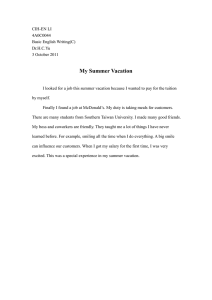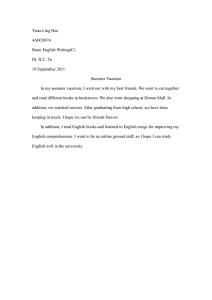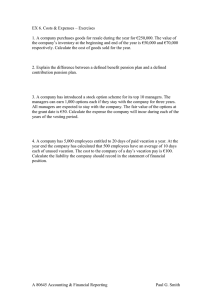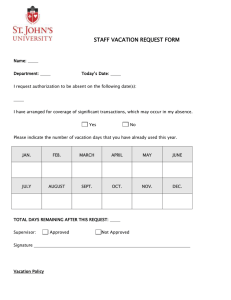Stellenbosch University Faculty of Engineering Module Framework
advertisement
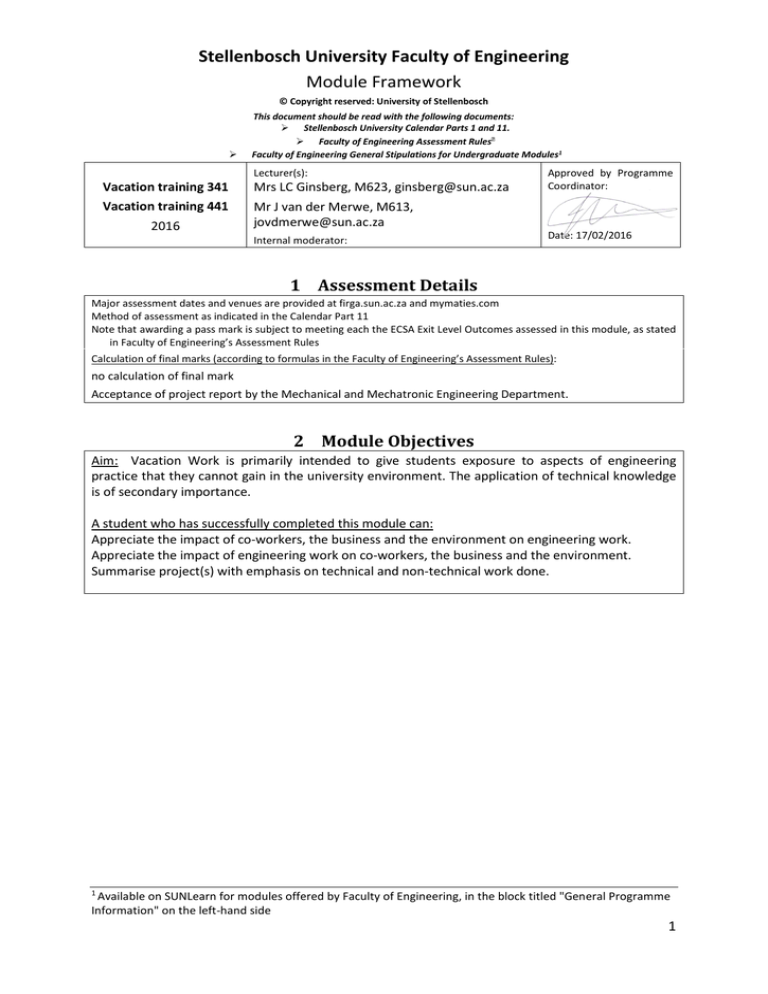
Stellenbosch University Faculty of Engineering Module Framework © Copyright reserved: University of Stellenbosch Vacation training 341 Vacation training 441 2016 This document should be read with the following documents: Stellenbosch University Calendar Parts 1 and 11. Faculty of Engineering Assessment Rules Faculty of Engineering General Stipulations for Undergraduate Modules1 Lecturer(s): Approved by Programme Coordinator: Internal moderator: Date: 17/02/2016 Mrs LC Ginsberg, M623, ginsberg@sun.ac.za Mr J van der Merwe, M613, jovdmerwe@sun.ac.za 1 Assessment Details Major assessment dates and venues are provided at firga.sun.ac.za and mymaties.com Method of assessment as indicated in the Calendar Part 11 Note that awarding a pass mark is subject to meeting each the ECSA Exit Level Outcomes assessed in this module, as stated in Faculty of Engineering’s Assessment Rules Calculation of final marks (according to formulas in the Faculty of Engineering’s Assessment Rules): no calculation of final mark Acceptance of project report by the Mechanical and Mechatronic Engineering Department. 2 Module Objectives Aim: Vacation Work is primarily intended to give students exposure to aspects of engineering practice that they cannot gain in the university environment. The application of technical knowledge is of secondary importance. A student who has successfully completed this module can: Appreciate the impact of co-workers, the business and the environment on engineering work. Appreciate the impact of engineering work on co-workers, the business and the environment. Summarise project(s) with emphasis on technical and non-technical work done. 1 Available on SUNLearn for modules offered by Faculty of Engineering, in the block titled "General Programme Information" on the left-hand side 1 3 Module Content and Schedule Vacation Training 341 and Vacation Training 441 must be done in two separate terms. Vacation Training 341 may be done at any time after the start of a student's second academic year. Vacation Training 441 may be done at any time after the start of a student's third academic year. Duration: A term either consists of a 4 week uninterrupted block (i.e. 20 consecutive working days), or 4 weeks work split up into 2 blocks of at least 2 weeks per block (i.e. 10 or more consecutive working days in each block). Exceptions: Public holidays – Two public holidays per Vacation Training module can be taken off. If there are more than two public holidays during the time which you work, the third and subsequent public holidays need to be made up. Sick days – Three sick days per Vacation Training module can be taken off. You need to submit a valid sick note with the report. The sick note should clearly state the days that you were sick. If you are sick more than three days, the sick days after the third need to be made up. Re-exams – Two days for re-exams per Vacation Training module can be taken off. Only the day of the re-exam can be taken off. Additional days may not be taken off to study, students should study after-hours and over weekends. If there are more than two re-exams during the time that you work, the days that you wrote the third and subsequent re-exams need to be made up. Company closes earlier than expected – It may happen that the company decides on short notice to close earlier than initially planned. If this is the case, you need to inform one of the lecturers (listed on page 1 of the study guide) via email that you will not be able to work all the days you planned to work. The company needs to write a letter stating that it closed earlier than expected. This letter should be included in your report. You need to make up the missing working days if the company closes more than two days early. The value of Vacation Training is the exposure you get when you work in an engineering environment. Therefore, three days at most may be taken off for the reasons listed above. For example, if three days are taken off due to illness and you write a re-exam on another day, then one day needs to be made up. Any other arrangement regarding duration or interruptions must have prior written approval of the Chairman of the Department of Mechanical & Mechatronic Engineering or the lecturer responsible for the module. In planning vacation training, students should note that vacation training can normally not be done during the winter vacation in the final year, since most students have to work on their final year projects during that vacation. Due dates and exemptions: Vacation training reports must be submitted on the first Monday in March following vacation work during the summer vacation, and on the first Monday in August following vacation work in the winter vacation. Reports not submitted by these dates are normally only considered during the following semester. If the company where a student did the vacation work requires that they approve the report before submission, the student must make sure that he/she requests their approval early enough. Written and well-motivated requests regarding extensions to due dates may be made to the Chairman of the Department at least one week before the due date. Extensions are not granted unless done so in writing by the Chairman of the Department. Applications for partial exemptions from Vacation Training 341 can be submitted to the Chairman of the Department of Mechanical & Mechatronic Engineering if a student has completed an apprenticeship or has completed one or more period of practical training as part of engineering studies at a Technicon. The application must be accompanied by supporting documentation. Exemption is not granted unless done so in writing by the Chairman of the Department. 2 4 ECSA Knowledge Area Credits Mathematical Sciences 0 Natural Sciences 0 Engineering Sciences 0 Design and Synthesis 0 Complementary Studies 0 3 5 Other Module Specific Information 5.1 Practical Arrangements It is the responsibility of the student to make the necessary arrangements to do vacation training. Students can request assistance by contacting the Chairman of the Department of Mechanical & Mechatronic Engineering. During vacation training, the student is subject to the normal rules, disciplinary regulations and safety requirements of the company where the training is done. The University of Stellenbosch accepts no responsibility or liability for any damage or injury caused by or to the student while busy with vacation training. 5.2 Acceptable Vacation Training With the exception of vacation training done in the Department of Mechanical & Mechatronic Engineering, any mechanical/mechatronic engineering work done under the guidance of an engineer with a university engineering degree is acceptable for vacation training. Working under the guidance of a professional engineer is preferable. In other cases, prior approval of the scope and content of the vacation training must be obtained from the Chairman of the Department of Mechanical & Mechatronic Engineering or the lecturer responsible for the module. Although a wide range of scenarios are acceptable for vacation training, it is not practical to be more specific in this study guide. Vacation training may only be done in an educational environment (such as the Department of Mechanical & Mechatronic Engineering) if specifically approved in writing by the Chairman of the Department or the lecturer responsible for the module. A request for approval, describing the scope of the technical work, the arrangements for supervision of the student and measures to ensure that the student will experience a context similar to engineering practice, must be submitted to the chairman or lecturer responsible for the module at least two months before the intended period of vacation training. Normally not more than one vacation training period can be done in the Department and only for Vacation work 441. The overlap between the vacation training and the student's final year project must be minimal. Students who are on the University Reserve training Programme – SA Navy must contact the lecturer responsible for this module for approval and additional information. 5.3 Vacation Training Report Recognition for any vacation training term is only given on the basis of the submission of an acceptable report. Vacation training reports should be completed just before the student completes the term of training so that the student's superior during the training can approve the report. In cases where the company providing the vacation training requires prior approval of the report due to confidentiality or security reasons, it is the student's responsibility to obtain the necessary permissions to submit the report to the department. 4 Included in the report must be a duly completed and signed Vacation Training Certificate authorised by the company where the vacation training was done. If a submitted report is found to be unacceptable by the Department, the Chairman of the Department may, at his/her discretion, offer the student the opportunity to revise parts or all of the report within a prescribed time. In such a case, the report will be reconsidered by the Department. In cases where the company requires a report from a student, the Department will accept the report in lieu of the technical summary of the vacation training report provided prior arrangements have been made with the Chairman of the Department of Mechanical & Mechatronic Engineering or the lecturer responsible for the module. 5.3.1 Vacation Training Report Format Vacation work reports must be printed on A4 paper. All reports must be typed (12 pt font, single spaced), the Vacation Training Certificate may be completed by hand. 5.3.2 Vacation Training Report Contents 1. Vacation training certificate (first page) Vacation work certificate completed, stamped and signed by an authorised representative of the firm or institution. 2. Proof of registration (second page) The proof of registration is typically be an official SU document that lists the modules you have enrolled for. You will typically get such a document after February 2016. 3. Single page technical summary (third page) This section should include a summary of technical work in which the student participated or of the work witnessed by the student. The department of the firm, the apparatus used and the experimental/operating procedures (where applicable) should briefly be described. 4. Single page non-technical summary (fourth page) This section should summarise one of the following aspects: • The organisation, its management structure (e.g. levels of hierarchy, matrix structure, project team management, etc.), and how it relates to divisional boundaries, geographic distribution, etc. • The production methods, including aspects such as factory lay-out, production planning and scheduling, production methods, handling of materials, maintenance, etc. • The firm's quality assurance procedures and processes. • The firm's logistics and supply chain management, including aspects such as modes of transport, size and location of inventory, approval of suppliers, etc. • The firm's application of the Occupational Health and Safety Act, including aspect such as safety procedures, training of workers, providing a healthy working environment, preventing negative impacts on the environment of the public, etc. • The management of labour relations, including aspects such as training, recruitment, disciplinary procedures, etc. 5
